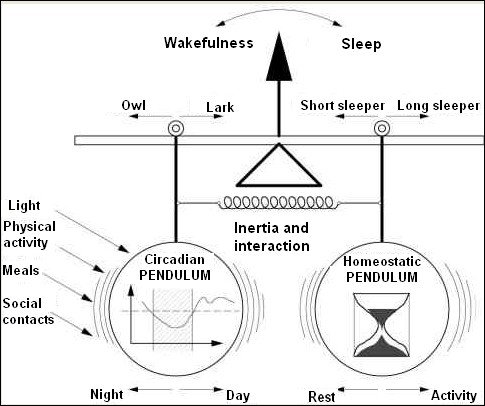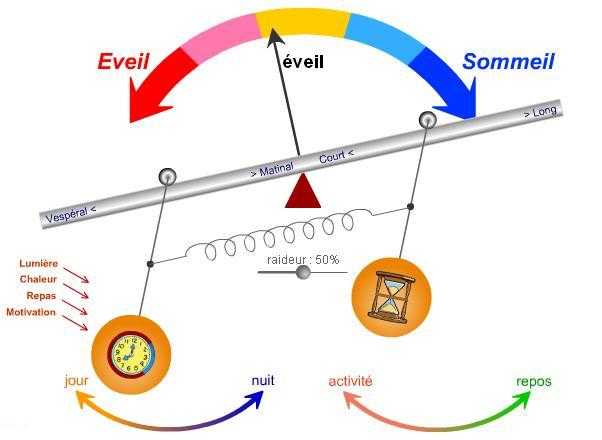Home > Welcome > Sleep-wake pathologies > Insomnia - wanting to sleep > Counterproductive thoughts and behaviors
Counterproductive thoughts and behaviors
Monday 1 December 2008, by
All the versions of this article: [English] [français]
We do not suffer from the facts but from the representations which we have of the facts ", Epictète (50 - 125 approx.)
Some mental structures lead to extremely “somnotoxic” behaviours which contribute to aggravating insomnia and/or tiredness.
Here are some examples (from consulting patient"s cases) of mental structures and behaviourals pattens bad sleepers lock themselfs to.
The counterproductive thoughts and behaviors.
The behaviors of the "insomniac" subject (who suffers from tiredness from the morning on, and sometimes during years) are always coherent with his/her thoughts.
These thoughts are drawn from the conclusions of some painful experiments.
Often efficient in the beginning (because they result in extending the sleep duration), these behaviors later prove to be systematically useless and even very harmful at the stage of acquired insomnia.
These patterns cannot be changed as long as the sick person doesn’t understand the real mechanisms of his/her insomnia.
Several examples of thinking that must be called into question:
- stay in bed hoping to fall asleep again;
- counting sheeps...;
- forbid oneself to move in fear of becoming more awake;
- get nervous thinking about what the next day will be like if one doesn’t fall asleep quickly;
- fall asleep in front of the television or with the radio on;
- go to sleep on the living room couch;
- start to play computergames (Internet...);
- play sport "to become tired";
- take alcohol or a sleeping pill «on demand»;
- sleep in whenever it is possible;
- have an "as long as possible" nap;
- go to sleep as early as possible in the evening.
Performant behavioral countermeasures:
Read the article about the Seven principles for learning to sleep.
- Do not try to "empty your mind"...!
Unlike the usually spread ideas claim it is supposed to be... It is not possible to think about nothing when someone is awake !
Quite the opposite : it is interesting to try to take advantage of that time which our brain offers us for thinking. (Many good ideas are produced at that moment. ("Take advice from your pillow").Initial insomnia exerts, towards worrries, a protecting role analog to that of fever in the case of infection.
That insomnia described as "physiological", in reaction to a stress, is a way to optimize the abilities of defence of the individual.
Moreover, it is the precise moment (the moment when someone thinks about something) that the "silent thief" will choose to steel the thoughts away "and maybe you’re already asleep..."(Thus spoke Zarathustra). - The "rule of the 20 minutes": Get out of bed ! after maximum 20 minutes of boredom.
First, in order to stop loosing one’s time;
Then, to allow the bed to refresh (Cf. sleep and heat).
Finally, because it is the best thing to do to manage to fall asleep 20 minutes later.
Nb. If someone chooses to stay in bed, it is necessary to accept the idea that that wait, apparently endless, is probably filled with episodes of "micro-sleep" that are not perceived.
The "insomniac sleeper" doesn’t perceive the sleep onsets which maintain insomnia but admits that he/she dreams...a little. (Cf. "Words of insomniacs") That dream is necessarily preceded by slow light sleep but that stage is sometimes perceived like wakefulness.
Everyone has heard, at once least, a sleeper claim that he/she wasn’t asleep while everyone else was listening to him/her snoring since 5 minutes.
Knowing that, it is imperative to keep a fixed get up schedule in the morning, no matter what time one thinks he/she has slept. - Control of the stimulus.
The purpose is to try to take advantage of the time that has been saved from sleep while favorising thermal losses
Go to another room, drink a small glass of something fresh (with ice);Do not hesitate to refresh with a lukewarm bath, a walk on the balcony or a couple of breathing exercises in front of the open window;
Do not lie down in another room but choose to stay on a chair in a fresh place to keep busy for a little while (magazines ? a letter ? a phonecall ? make a puzzle, crosswords and so on... );
- Nb. The "practice of relaxing exercises" requires to learn about it and to train during the day.
When mastered correctly, relaxation can help in the case of a physiological reaction of hyperarousal but doesn’t fit everybody. It is, yet, an illusion to rely only on relaxation to fall asleep when someone suffers from insomnia.
Counterproductive cognitions or brooding over :
There are three feelings that have the power to keep awake or wake up any good sleeper :
1 : Motivation : the insomniac subject wants to sleep no matter what.
2 : Anger : the insomniac subject is ready for anything to get it.
3 : Fear : the insomniac subject fears not to be able to accomplish his duties of the day.
- «I have to sleep, it is already too late»;
- «Too bad, I’ll just stay here and wait!!" or "So what, I’m going to take a sleeping pill»;
- «I’m going to go crazy», "I’m going to have a heart attack, high bloodpressure".
Performant thoughts and cognitions :
- I’m not sleepy now, nothing will make me sleepy ...
... (but I already know, on the other hand, what sort of feelings will wake me up if I let myself get carried away). - It’s unpleasant because I would like very much to manage to sleep ...
- ... but in fact, I am (already) aware that it is not always definitive.
- ... because (now) I understand why my brain is not in the condition of sleeping straight away. (Exciters, shifted schedules, life events...)
- ... because I know what I have to do now (during the coming hour)
- ... because I know what I will possibly do tomorrow in order to (maybe) compensate the missing sleep.
- ... because I know what I will have to do to act on my internal clocks and correct that unfortunate hitch;
(Sleep typology;
Management of the nap;
Sleep and wake hygiene) ...
... because I know that, in the end, it will not necessarily ruin my day.
Conclusion
One must understand before acting.
Every behavioral constraint in contradiction with the thoughts of the subject is bound to fail.
It is essential not to make the "bad sleeper" feel guilty, because his/her attitude is well-founded in the sense that he/she doesn’t possess the information about chronobiology that is necessary to change his/her angle of vision.
From the angle from which he/she watches sleep, what he/she thinks or does is absolutely logical. It is necessary to learn to think sleep in the correct way.
"Think sleep differently".
See the "7 principles to learn to sleep"
It is important, for an insomniac person, to learn to be able to locate his/her arousals in relation to the thermic minimum in the middle of the night
It is in function of the knowledge of his/her internal clocks and in particular his/her sleep typology that he/she will choose the most performant behavior to act.
Sleep is individual and deserves individual information.

- An unstable system in balance

- Quelques liens externes pour en savoir plus...
